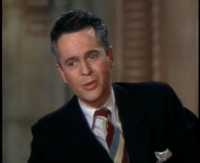Larry Parks (December 13, 1914 – April 13, 1975) was an American stage and movie actor. He was born Samuel Klausman Lawrence Parks. His career was virtually ended when he admitted to having once been a member of a Communist party cell, which led to his blacklisting by all Hollywood studios.
Background
Parks grew up in Joliet, Illinois, graduating from Joliet Township High School in 1932. He attended the University of Illinois as a pre-med student, and played in stock companies for a few years before signing a movie contract with Columbia Pictures in 1941. As did most Columbia contract players, he played supporting roles in higher-budgeted films, and larger roles in B pictures, such as 1942's Atlantic Convoy.
When Columbia was preparing a screen biography of Al Jolson, many big-name stars were considered for the title role, including James Cagney and Danny Thomas (both of whom turned it down), but resident contractee Larry Parks was reportedly the first actor to be interviewed. Parks impressed the producers and won the role. At the age of 31, his performance in The Jolson Story (1946) earned him a "Best Actor" Academy Award nomination.
Stardom and blacklisted
Now that Parks was a full-fledged star, Columbia kept him busy in elaborate productions (including a couple of costume epics) until he appeared in the sequel, Jolson Sings Again (1949), which was another huge boxoffice hit. His co-star in the film, Barbara Hale, teamed with him again in the comedy feature Emergency Wedding.
In 1951 Larry Parks was summoned to appear before the House Committee on Un-American Activities, under threat of being blacklisted in the movie industry, but he begged not to be forced to testify. He eventually did so in tears, only to be blacklisted anyway. Larry Parks eventually gave up the names of his former colleagues and submitted to the HUAC.[1] Following his admission before the committee, Columbia Pictures dropped him, and a romantic comedy he made for Metro-Goldwyn-Mayer was shelved for three years. Parks made only a few more films, but continued to eke out a living acting on the stage and doing occasional television programs. He last appeared, in a major role, in the John Huston film Freud the Secret Passion (1962).
Parks formed a highly successful construction business, and eventually he and his wife Betty Garrett owned many apartment buildings scattered throughout the Los Angeles metropolitan area. Rather than sell them upon completion, Parks decided to retain ownership and collect rents as a landlord, a decision that proved to be extremely profitable. During this period, the couple occasionally performed in Las Vegas showrooms, summer stock productions, and touring companies of Broadway shows.
